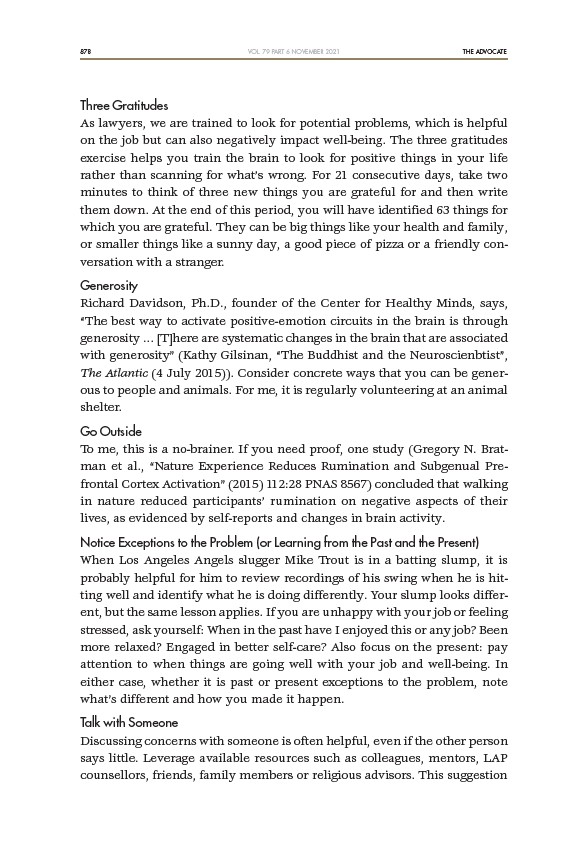
878 THE ADVOCATE
VOL. 79 PART 6 NOVEMBER 2021
Three Gratitudes
As lawyers, we are trained to look for potential problems, which is helpful
on the job but can also negatively impact well-being. The three gratitudes
exercise helps you train the brain to look for positive things in your life
rather than scanning for what’s wrong. For 21 consecutive days, take two
minutes to think of three new things you are grateful for and then write
them down. At the end of this period, you will have identified 63 things for
which you are grateful. They can be big things like your health and family,
or smaller things like a sunny day, a good piece of pizza or a friendly conversation
with a stranger.
Generosity
Richard Davidson, Ph.D., founder of the Center for Healthy Minds, says,
“The best way to activate positive-emotion circuits in the brain is through
generosity … There are systematic changes in the brain that are associated
with generosity” (Kathy Gilsinan, “The Buddhist and the Neuroscienbtist”,
The Atlantic (4 July 2015)). Consider concrete ways that you can be generous
to people and animals. For me, it is regularly volunteering at an animal
shelter.
Go Outside
To me, this is a no-brainer. If you need proof, one study (Gregory N. Bratman
et al., “Nature Experience Reduces Rumination and Subgenual Prefrontal
Cortex Activation” (2015) 112:28 PNAS 8567) concluded that walking
in nature reduced participants’ rumination on negative aspects of their
lives, as evidenced by self-reports and changes in brain activity.
Notice Exceptions to the Problem (or Learning from the Past and the Present)
When Los Angeles Angels slugger Mike Trout is in a batting slump, it is
probably helpful for him to review recordings of his swing when he is hitting
well and identify what he is doing differently. Your slump looks different,
but the same lesson applies. If you are unhappy with your job or feeling
stressed, ask yourself: When in the past have I enjoyed this or any job? Been
more relaxed? Engaged in better self-care? Also focus on the present: pay
attention to when things are going well with your job and well-being. In
either case, whether it is past or present exceptions to the problem, note
what’s different and how you made it happen.
Talk with Someone
Discussing concerns with someone is often helpful, even if the other person
says little. Leverage available resources such as colleagues, mentors, LAP
counsellors, friends, family members or religious advisors. This suggestion